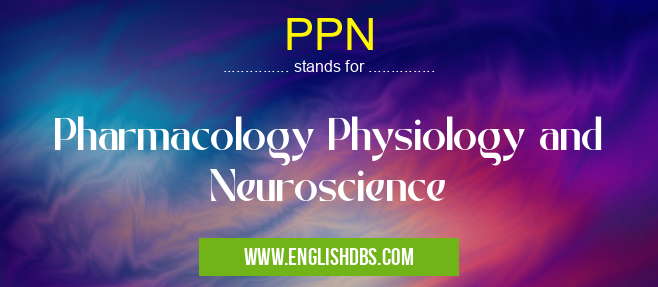What does PPN mean in PHARMACY
PPN is a multidisciplinary field that combines the study of pharmacology (the science of drugs), physiology (the study of how organisms function), and neuroscience (the study of the nervous system). It seeks to understand how drugs interact with living systems and how they affect physiological and neurological processes.

PPN meaning in Pharmacy in Medical
PPN mostly used in an acronym Pharmacy in Category Medical that means Pharmacology Physiology and Neuroscience
Shorthand: PPN,
Full Form: Pharmacology Physiology and Neuroscience
For more information of "Pharmacology Physiology and Neuroscience", see the section below.
- PPN is an abbreviation commonly used in the medical field, standing for "Pharmacology Physiology and Neuroscience."
Meaning in MEDICAL
- PPN encompasses the study of how drugs, biological systems, and the nervous system interact with each other.
- It focuses on the mechanisms of action, effects, and therapeutic uses of drugs, as well as the physiological and neurological processes that underlie these interactions.
Full Form
- Pharmacology Physiology and Neuroscience
What does PPN Stand for?
- PPN stands for the following in the medical context:
- Pharmacology: The study of drugs, their properties, and their effects on living organisms.
- Physiology: The study of the function and mechanisms of biological systems, including the human body.
- Neuroscience: The study of the nervous system, including the brain, spinal cord, and peripheral nerves.
Essential Questions and Answers on Pharmacology Physiology and Neuroscience in "MEDICAL»PHARMACY"
What is Pharmacology, Physiology, and Neuroscience (PPN)?
How is PPN used in practice?
PPN knowledge is crucial for developing new drugs, understanding drug mechanisms of action, and optimizing drug therapy. It also informs the study of diseases, such as cardiovascular disease, neurodegenerative disorders, and cancer, and the development of treatments and interventions.
What are the career opportunities in PPN?
PPN graduates can pursue careers in academia, research, healthcare, the pharmaceutical industry, and regulatory agencies. Job titles may include research scientist, clinical pharmacologist, drug safety officer, or medical science liaison.
Is PPN a good career choice?
Yes, PPN offers a wide range of career opportunities in growing industries with high demand for skilled professionals. It provides a strong foundation for understanding the complex interactions between drugs, organisms, and diseases.
What are the educational requirements for a career in PPN?
Typically, a bachelor's degree in a relevant field such as biology, chemistry, or biomedical science is required. Most careers in PPN also require a graduate degree, such as a Master of Science or PhD, in pharmacology, physiology, neuroscience, or a related field.
What are the benefits of studying PPN?
Studying PPN provides a comprehensive understanding of the mechanisms of drug action, physiological processes, and neurological function. It develops critical thinking, problem-solving, and analytical skills. PPN graduates are also highly sought after by employers due to their specialized knowledge and expertise.
Final Words:
- PPN represents a multidisciplinary field that combines pharmacology, physiology, and neuroscience to understand the complex interactions between drugs, biological systems, and the nervous system.
- This knowledge is essential for developing effective therapies, understanding drug mechanisms, and improving patient outcomes in various medical conditions.
PPN also stands for: |
|
| All stands for PPN |
